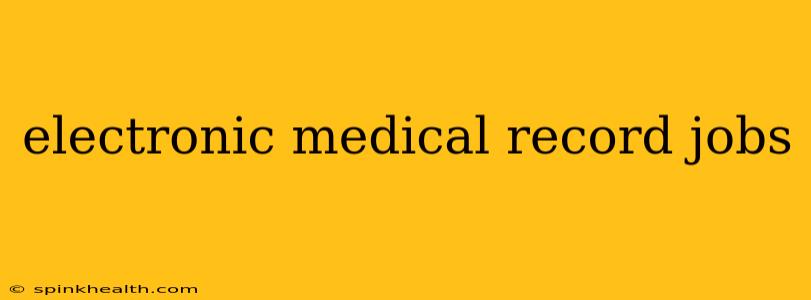Charting a Course: A Deep Dive into Electronic Medical Record (EMR) Jobs
The world of healthcare is rapidly evolving, and at the heart of this transformation lies the electronic medical record (EMR). These digital repositories of patient information are no longer a luxury but a necessity, fueling a surge in demand for skilled professionals who can navigate, manage, and optimize their use. This isn't just about data entry; it's about shaping the future of patient care. Let's explore the diverse and rewarding career paths within the exciting field of EMR jobs.
My name is Sarah, and I've spent the last decade working in various roles within the healthcare IT sector, witnessing firsthand the dramatic growth and evolution of EMR systems. I'll share my insights and experiences to help you understand the opportunities available.
What are the different types of EMR jobs?
This isn't a one-size-fits-all field. The world of EMR jobs offers a wide spectrum of roles, each demanding a unique skillset and level of expertise. Some popular options include:
-
EMR Specialists/Analysts: These professionals are the architects and guardians of the EMR system. They design, implement, and maintain the system, ensuring its smooth operation and compliance with regulations. Their expertise goes beyond simple data entry; they understand the intricate workings of the software and optimize its functionality for the entire healthcare team.
-
EMR Trainers: Think of these individuals as the patient advocates within the digital realm. They're responsible for educating healthcare providers on how to effectively utilize the EMR system. This requires excellent communication skills and a deep understanding of the software's features, as well as the specific needs of the users.
-
Medical Coders: These individuals play a crucial role in the financial health of healthcare organizations. They translate medical diagnoses and procedures into standardized codes used for billing and insurance purposes. With the increasing reliance on EMRs, medical coders are essential in ensuring accurate and efficient claim processing.
-
Data Entry Clerks: While seemingly straightforward, this role is the backbone of many EMR systems. Accurate and efficient data entry is paramount for ensuring data integrity and the overall functionality of the system.
-
Health Informatics Specialists: These professionals bridge the gap between healthcare and technology. They focus on the analysis and interpretation of healthcare data, using their expertise to identify trends, improve processes, and support evidence-based decision-making.
What skills are needed for EMR jobs?
Regardless of the specific role, certain skills are highly valued within the EMR field:
-
Technical Proficiency: A solid understanding of computer systems and software is crucial. Familiarity with various operating systems and database management systems is a significant advantage.
-
Healthcare Knowledge: A strong understanding of medical terminology, healthcare procedures, and regulatory compliance is essential. This enables you to effectively interact with healthcare professionals and interpret medical data.
-
Data Analysis Skills: The ability to analyze large datasets, identify trends, and draw meaningful conclusions is increasingly important, especially for analysts and informatics specialists.
-
Communication Skills: Excellent communication is essential for training, collaboration, and troubleshooting. The ability to clearly explain technical concepts to non-technical audiences is highly valued.
What is the salary range for EMR jobs?
Salary expectations vary widely depending on experience, location, and specific job title. Entry-level positions like data entry clerks may have lower starting salaries, while experienced EMR analysts or health informatics specialists command significantly higher compensation packages.
What are the educational requirements for EMR jobs?
The educational requirements also vary depending on the specific role. Some positions may only require a high school diploma or equivalent, while others require a bachelor's or even a master's degree in health informatics or a related field. Certifications in specific EMR systems or healthcare IT are also highly beneficial.
How can I find EMR jobs?
Numerous resources can help you find EMR job openings. Online job boards, healthcare-specific recruitment agencies, and direct applications to healthcare organizations are all effective avenues. Networking within the healthcare industry can also lead to valuable opportunities.
The field of EMR jobs is dynamic and ever-evolving, offering a wide array of opportunities for those with a passion for healthcare and technology. By understanding the diverse roles, required skills, and educational paths, you can embark on a rewarding career that contributes to the advancement of patient care. The future of healthcare is digital, and your expertise can help shape it.

